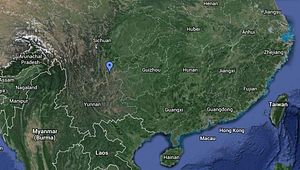On Sunday, a magnitude 6.5 earthquake hit the mountainous region of northern Yunnan province. As of Monday, Chinese state media were reporting at least 398 dead with another 1,800 injured. Most of the casualties occurred in Ludian County, the location of the earthquake’s epicenter. 230,000 survivors had to be evacuated from their homes.
Both the Yunnan provincial government and Beijing moved quickly to get rescuers and aid to the affected areas. By Monday, Yunnan province had sent 7,000 rescuers to the area and Beijing had sent 7,000 soldiers and paramilitary to Yunnan to assist with rescue operations. However, rescue operations were severely hampered by damaged and destroyed roads and downed communication lines. Heavy rain in the area made a bad situation worse, increasing the risk of landslides. Rescuers are having difficulty getting medicine, food, and tents to the people who most urgently need them. Medics in Ludian County told Xinhua they were experiencing “severe shortages of medicine,” even as more wounded continued to be brought for treatment.
The Chinese government has made rescue efforts its top priority. Premier Li Keqiang arrived in Ludian County on Monday to personally inspect the situation. Li urged an immediate focus on rescue efforts, particularly searching through debris for survivors. He also emphasized the urgency of providing for survivors’ basic needs: “(We must) ensure people have access to food, clothes, safe dwelling places and clean water,” Xinhua quoted Li as saying.
Li also called for disaster relief efforts to be “open and transparent so as to boost social confidence in the quake relief.” In the wake of the 2008 Sichuan earthquake, which killed roughly 70,000 and left over 4 million homeless, many in China worried that donations meant for the relief effort were being misused. China’s National Audit Office found in 2012 that $228 million of funds meant for reconstruction efforts in Sichuan had been used for other purposes or outright embezzled. That revelation and other scandals involving China’s state-run charities have damaged faith in these institutions. Li is clearly aware of this and does not want mistrust to hamper relief efforts.
And relief efforts will have to continue for months if not years. Xinhua reports that over 200,000 houses have been damaged, with 80,000 homes having collapsed completely. Rehousing those residents will be a long-term problem, as will restoring communications and transportation networks within the difficult terrain.

































